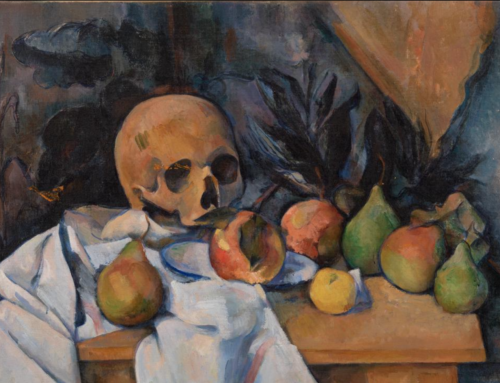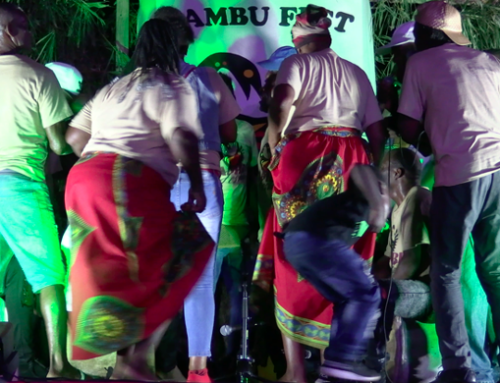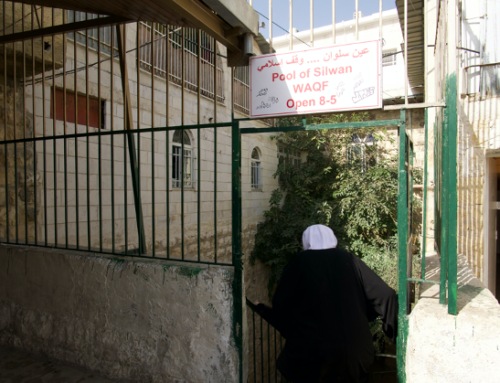How can revolution have a consequential presence without being recast as the prequel to—or a break from—the liberal democratic present? In post-revolutionary Tunisia, the democratic present became a key site for embedding the legitimacy and agency of internationally promoted liberal democracy. I probe the synergy that forged this democratic present as a mono-present through the discursive labor of veteran revolutionary leftist militants currently in their sixties and seventies. While these militants were active in this liberal mono-present, they fervently defended a stance of not being of this present. I ponder over the conceptual framing that can best endow their labor with ethico-political significance for the present. I draw on Laura Bear’s proposition that an anthropological epistemology of modern time needs to combine “representations, technologies, and social disciplines of time” with people’s “labor in/with time” (2014, 13). I substitute Bear’s focus on capitalism with one of its main allies, liberal democracy. I zoom in on the democratic present as one of the most visible instantiations of modern time.
The veteran revolutionary leftist militants in question are survivors of a violently suppressed movement known as either Perspectives or Afaq ( افاق, Prospects) or by its subsequent name al-Amil al-Tounsi (ال عامل ال تونسي, The Tunisian Worker). Drawing on Marxist-Leninist, Trotskyist, and Maoist visions, this self-described “far left” movement was responsible for mobilization against the single-party state of Habib Bourguiba (1956-1987) from the mid-1960s to the late 1970s. The movement engaged in propaganda and agitation with a view to prepare the Tunisian peasantry to lead a socialist revolution that would undo the damage of the state’s economic liberalization and political alignment with the West. The movement was galvanized by the Vietnam War, the six-day Arab-Israeli war in 1967, and decolonizing struggles across the globe. Members of the movement published, discussed, and protested in a heavily state-controlled environment. Whenever arrested, they were tortured, tried at Special Security Courts summoned just for them, and languished in prison for as long as 16 years. State attempts to muzzle them continued after they served their sentences through house arrests, forced migration, and economic marginalization. Despite their persecution, members of the movement remained politically active long after its dissolution and until (and after) the Tunisian revolution in 2011 (see Boutieri 2023).
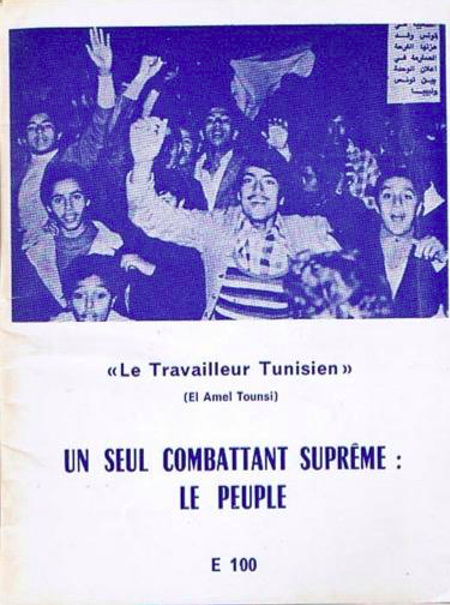
Cover of one of the many clandestine publications of the movement The Tunisian Worker (al-Amil al-Tounsi), 1975. The title says: “The Only Supreme Combatant is the People.” The statement is a twist—and direct challenge—to Habib Bourguiba’s self-labelling as the Supreme Combatant. From the open, digitized archive of the movement’s publications available at https://nachaz.org/archives-du-present/.
In 2011, mass protests and sit-ins across Tunisia led to the dismantling of the police state that had been headed by President Ben Ali since 1987, as well as to the pronouncement of a successful revolution by many in Tunisia and abroad. With the lifting of state censorship, Perspectives militants finally lay claim to their ethico-political positions in the expanding Tunisian public sphere. This happened through various channels: adherents of the political left—workers’ parties, worker’s unions—elevated the historical events that implicated the movement (protests, strikes, trials) as their insurrectional predecessors. Members of the civic left–academics, journalists, student unions, human rights activists–drew on the group’s clandestine publications, personal correspondences, and prison memoirs to piece together an intellectual pedigree of left-leaning demands for social justice. Both channels solicited the group’s discursive involvement and appropriated members’ biographies and writings, and a selection of events of its various encounters with the state.
However, the appearance of the Perspectives group in the public sphere through the retelling of national history and the interlocked process of national reconciliation diluted the movement’s radicality and recast its trajectory as one of the pathways to an inevitable liberal democratic present. Specifically, many projects of new memory making, such as commemorative conferences and their ensuing publications, disentangled the movement from the global radical politics of the long 1960s and embedded it in a purely national framework as a distinct (and purified) sociological category: a Tunisian student movement, the first generation of university graduates etc. The movement’s calls for a peasant revolution and their fierce egalitarianism–through declassification, the refusal of representation, and their unbending solidarity outside and inside prison–gave way to explanations that qualified them mostly as democrats avant la lettre. This sociological dilution was as effective as the biographical one. Namely, the Truth and Dignity Commission that headed the national transitional justice initiative (active from 2013 to 2019) invited veterans to public hearings under the category “victims of gross violations: extra-judicial imprisonment and torture.” The individualization of their testimony and the foregrounding of their suffering sidelined—if not silenced anew—their collective, cross-sectional, and transnational campaigns against the first post-independence state. In both their sociological and biographical appropriations, members of the movement became public in the present moment through liberal translation, which made them more palatable to the liberal democratic mono-present.
Mono-presentism consisted of the following: the international arena portrayed the Tunisian revolution of 2011 as an exception to a region steeped in either religious and political conservatism or in perennial conflict. Prominent voices among the Tunisian political elite reverberated this rhetoric by compressing the revolution as a temporary breach and by presenting the Tunisian state as having followed a steady course of gradual democratization from colonial independence in 1956 to 2011. This narrative hinged on the theory that a shared liberal habitus dating back to late 19th century and mid-20th century legal reforms managed to generate broad consensus among the polity regarding the economic organization and social commitments of democratic Tunisia (Meddeb and Marzouki 2016). Such mono-presentism vexed the veteran militants of the collective. Their statements in the above public forums were often incongruent with the discourses that brought them into public recognition. For example, in human rights forums, they often asserted their political identity by insisting that they have “always lived as communists.” On those occasions meant to seal the transition to democracy, such as transitional justice hearings, they would declare that “the revolution is always present.” Through this stance, the veterans probed the liberal democratic mono-present by bringing into public view the enduring values of socialist revolution.
This performative negotiation was matched by their more quotidian labor to dwell in a different present through the screening and discussion of political films in ciné-club assemblies. The tripartite formula of the ciné-club (presentation-screening-debate), introduced in the national educational system by French teachers in the 1950s, embedded a pedagogy of deliberation at the heart of the activity. As elsewhere, it was left militants, among whom the Perspectives movement, who used the ciné-club most systematically as a space for discussion, for establishing networks, and for developing their organizational know-how. In the post 2011 environment, the collective re-operationalized the ciné-club as a forum for generative socio-political discussion. They opened it up to a transgenerational public both inside university campuses and in small associations in Tunis and the provinces.
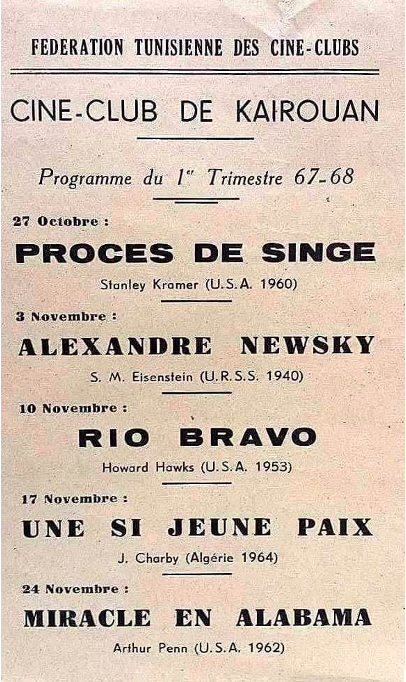
Poster advertising film screenings at the ciné-club of Kairouan, 1967-1968. Archive of Mounir Fellah, ex-president of the Tunisian Federation of Ciné-Clubs, reproduced with permission.
Ciné-club assemblies generated a chronotope that differed substantially from the messianic time of liberal democracy (Fukuyama 1989) or the debt punctuated time of advanced capitalism (Guyer 2007). This left militant chronotope did not just replace linear time with static or cyclic time; something more compound was at play. For one, the militant films invited viewers to see the Tunisian revolution of 2011 as not only inaugurating a wave of global unrest, but also as bringing to fruition agendas for radical change dating back to the 1960s. This was especially important for the Perspectives movement and their ideological adherents: despite their long wait and numerous interruptions, they could hail the present as the current instantiation of their long-term revolutionary aspirations. However, the ‘militant image’ was not just chronologically sequential. It also enacted what Bear calls a “thickening” of the present (2014, 7). Specifically, the dissemination of the militant image unearthed the “latent potentialities of the spectator” and hence turned film viewing into preparation for potential “revolutionary praxis” (Eshun and Gray 2011, 5-6). We can add to the above the numerous acts of prefiguration through collective decision-making and the non-hierarchical discussion format of the ciné-club assembly, all of which anticipated alternative social futures. In all these respects, the ciné-club assembly was a filmic event that replaced the liberal democratic mono-present with an expansive revolutionary present. I use the word expansive to gesture at both the geographical reach of revolutionary action and to a temporality of revolution that does not qualify it as brief rupture but, rather, as an immanent condition of the political.
If these veterans were up to the task of confronting mono-presentism, how can our analytical framing of their labor rise to the occasion? In her critique of the commemoration of the May 68 mass protests and mass strikes in France, Kristin Ross (2008) accused French sociology and anthropology of stripping the unprecedented nature of those events and subjugating them to longer superstructures such as higher education reforms. While not on Ross’s radar, British anthropology at the time was intensely preoccupied with a theory of radical change (for insightful reviews see Kapferer 2010 and Shah 2014). In American anthropology, Marshall Sahlins tackled the question through both the experience of anti-war campaigns in the US and a conversation with historiographic debates taking place in the French academy (see Sahlins 1991). More recent theorizations of events as moments of decision making that re-assemble the individual (Humphrey 2008) or watershed points in personal faith and community (Robbins 2010) have drawn on the philosophy of Alain Badiou (1988), a self-avowed Maoist in the 1960s and beyond. Yet while many of the above critical angles are persuasive, most of them zoom in on the discursive hailing of events in retrospect – namely, the event has already happened (see Lazar 2014). How can we bring the event into the quotidian experience of the present in a way that breaks frame from the liberal mono-present?
In an interview subsequently published under the title “Questions of Method”, Michel Foucault introduced the concept of “eventalization” as a prism through which to “mak[e] visible a singularity at places where there is a temptation to invoke a historical constant, an immediate anthropological trait, or obviousness which imposes itself uniformly on all” (quoted in Burchell at al. 1991, 76). French scholarship reviled Foucault as both biographically and theoretically alienated from the aspirations of May 68. Interestingly, Foucault rebutted these accusations in interviews where he narrated that he spent the spring of 1968 in Tunis. Invited by President Bourguiba to teach at the Faculty of Literature and the Humanities in the Tunis 9 Avril campus, Foucault allowed members of the Perspectives movement to print leaflets at his home, provided refuge to persecuted members, and advocated for their release from prison. In fact, in recent years, Perspectives militants have reconstituted Foucault as a militant voice who drew on his Tunisian experience to build his advocacy with the Maoist-inspired Groupe d’information sur les prisons (Group of Information on Prisons) and to develop his seminal work Discipline and Punish (Boubaker-Triki 2008). While I am wary of making Foucault a significant figure in the Perspectives story, I cherish this biographical and ethico-political overlap because it endows the leftist veterans with transformative potential beyond Tunisian politics. In fact, such overlap brings Perspectives into the very conceptual frames that have shaped our understanding of power (in our discipline and beyond) and reinforces the expansiveness of their revolutionary present in both time and space.
I conclude by emphasizing the joint labor involved in, on the one hand, creating the social conditions for an expansive revolutionary present and, on the other, rendering this present analytically legible. Writing this piece in 2023, during a moment of intense constitutional, governmental, and social reconfiguration under the leadership of a centralizing populist President, the stakes of this labor seem particularly high. If, today, a triumphant liberal democratic present declares the Tunisian revolution and its visions as failed, the expansive revolutionary present of the ciné-club and its reverberations in Tunisian public life refuses this closure and allows us to extend diverse visions of both revolution and democracy into the future.
References
Badiou, Alain. 2013 [1988]. Being and the Event. London: Bloomsbury Academic.
Bear, Laura. 2014. “Doubt, conflict, mediation: the anthropology of modern time.” Journal of the Royal Anthropological Institute 20:3-30.
Boubaker-Triki, Rashida. 2008. « Notes sur Michel Foucault à l’université de Tunis ». Rue Descartes 3:110-113.
Boutieri, Charis. 2023. “Events of Citizenship: Left Militantism and the Returns of Revolution in Tunisia.” History and Anthropology 34(2):175-193.
Burchell, Graham, Collin Gordon, and Peter Miller. 1991. The Foucault Effect: Studies in Governmentality. Chicago: University of Chicago Press.
Eshun, Kodwo and Ros Gray. 2011. “The Militant Image: A Ciné‐Geography: Editors’ Introduction.” Third Text 25(1):1-12.
Guyer, Jane I. 2007. “Prophecy and the Near Future: Thoughts on Macroeconomic, Evangelical, and Punctuated time.” American ethnologist 34(3):409-421.
Humphrey, Caroline. 2008. “Reassembling Individual Subjects: Events and Decisions in Troubled times.” Anthropological Theory 8(4):357-380.
Kapferer, Bruce. 2010. “Introduction: In the Event—Toward an Anthropology of Generic Moments.” Social Analysis 54(3):1-27.
Lazar, Sian. 2014. “Historical Narrative, Mundane Political Time, and Revolutionary Moments: Coexisting Temporalities in the Lived Experience of Social Movements.” Journal of the Royal Anthropological Institute 20:91–108.
Marzouki, Nadia and Hamza Meddeb. 2016. “The Struggle for Meanings and Power in Tunisia after the Revolution.” Middle East Law and Governance 8(2-3):119-130.
Robbins, Joel. 2010. “Anthropology, Pentecostalism, and the New Paul: Conversion, Event, and Social Transformation.” South Atlantic Quarterly 109(4):633-652.
Ross, Kristin. 2008. May’68 and its Afterlives. Chicago: University of Chicago Press.
Sahlins, Marshall. 1991. “The Return of the Event, Again; with Reflections on the Beginnings of the Great Fijian War of 1843 to 1855 Between the Kingdoms of Bau and Rewa.” In Clio in Oceania: Towards a Historical Anthropology, edited by A. Biersack, 37–99. Washington: Smithsonian Institution Press.
Shah, Alpa. 2014. “‘The Muck of the Past’: Revolution, Social Transformation, and the Maoists in India.” Journal of the Royal Anthropological Institute 20(2):337-356.
Charis Boutieri is Associate Professor of Social Anthropology at King’s College London. She has written about language, public voice, and citizenship in Morocco and Tunisia. Her book Learning in Morocco: Language Politics and the Abandoned Educational Dream (Indiana UP) was published in 2016. Her current research is on the post-revolutionary public sphere in Tunisia and its negotiation of liberal democratic ideals and practices.
Cite As: Boutieri, Charis. 2024. “Against Mono-Presentism”, In “Back to the Present” edited by Timothy P.A. Cooper, Michael Edwards & Nikita Simpson, American Ethnologist website, January 26 2024, [https://americanethnologist.org/online-content/collections/back-to-the-present/against-mono-presentism/]
